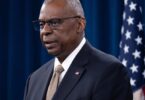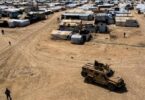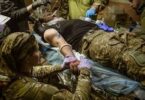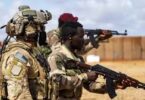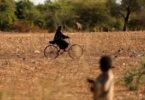YOLA (AP): Mariam Musa gestured with her hand toward her mouth, twisting her face as she told of her main problem: not enough to eat or drink. In the makeshift camp for Nigerians who have fled Boko Haram violence, the 32-year-old widow says that the upcoming presidential vote isn’t a topic of conversation. That’s because nearly all are more worried about putting food on the table. Lacking voter cards or afraid to trek back to their home villages where armed extremists may lurk, most of the 1,200 people in Malkohi camp are unlikely to vote in Saturday’s presidential election.
“God help us,” said Musa, one of many widows living in this makeshift settlement in Yola, capital of Nigeria’s northern Adamawa state. “We have no salt, no palm oil, nothing.” Asked if she planned to vote, she smiled ruefully and said: “I hear there is an election, but I lost my voter’s card.” Over 84 million Nigerians are registered voters in this West African country of more than 190 million. But in some parts of the north, where an insurgency by the Islamic extremist group Boko Haram has killed more than 27,000 people and displaced millions, thousands likely won’t be able to participate in the election. There are concerns about whether voting can take place at all in some areas facing arson attacks by alleged militants.
The northern extremist insurgency is one issue voters will consider as they choose between President Muhammadu Buhari, who was elected in 2015 on a promise to tackle insecurity, and Atiku Abubakar, a fellow northern Muslim and former vice president who similarly vows to restore security. For northerners displaced by Boko Haram violence, there is little enthusiasm for the polls even as they hope the outcome will somehow lead to peace in areas plagued by armed violence.
At Malkohi camp in Yola, hometown of opposition candidate Abubakar, more than 100 residents are widows whose husbands were killed in the violence. Four who spoke to The Associated Press ahead of the election said they won’t be able to vote. They are still terrified of going back home amid radio reports of continued Boko Haram attacks. Their stories are often horrific.

